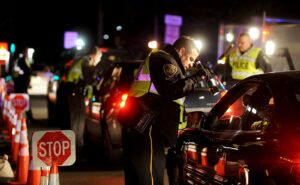
In ND and MN, your driver’s license might cost you your blood. Retweet
On January 26th we proposed filing an amicus brief in the case Birchfield v. North Dakota. This case reviews two states laws (from North Dakota and Minnesota) that make it illegal for citizens to refuse blood or breath tests during an intoxicated driving arrest. Many of our supporters responded with funding, and our attorneys were able to file the brief on February 10, 2016. A copy of that brief is available to read, if you so desire.
This brief is another attempt to extend the the victory we had in the U.S. v. (Antoine) Jones case. That ruling restored the original property rights basis of the Fourth Amendment over the long prevailing “right to privacy” standard.
The Birchfield case consolidates cases where state laws criminalize an automobile driver’s refusal to give blood and breath samples as part of a traffic arrest. The U.S. Supreme Court has previously refused to create an “exception” to the Fourth Amendment requirement that the police obtain a warrant before conducting these tests. North Dakota and Minnesota high courts tried to circumvent this requirement by making consent to such tests a pre-condition of having a driver’s license.
Yes, you read that right: These two state supreme courts essentially held that the right to drive an automobile required a waiver of a driver’s constitutional rights.
- Minnesota decided that a blood or breath search is simply a “search incident to arrest.” From there, they reasoned that a person has no privacy interest in his or her body once they have been arrested. Therefore, The State has unlimited power to do with him or her whatever it wishes.
- North Dakota concluded that by obtaining a driver’s license, a person is deemed to have given “consent” to such searches, and, in any event, the requirement to participate in chemical tests is “reasonable.”
In reviewing these cases the lower courts simply assumed that the only Fourth Amendment issue was whether drivers have a “reasonable expectation of privacy.” Neither court questioned whether the Fourth Amendment protected a property right — rather than a mere “expectation of privacy” interest.
In other words, both courts failed to account for the Jones decision.
In U.S. v. Jones the Supreme Court restored the Fourth Amendment’s private property “baseline.” The Jones court ruled that a search occurred when police placed a GPS tracking device on a vehicle. It was unnecessary to decide if the owner also had a “privacy” right to protect, because it was clear that the government had committed trespassed on the vehicle owner’s property.
The next year in Florida v. Jardines, the Court applied that same principle to a drug dog search, where the dog was brought to the front door of a home and then detected contraband. They ruled that the resulting search was unreasonable because the police had first trespassed on the homeowner’s property rights.
Alas, the Court has failed to apply these Fourth Amendment property principles consistently. The brief DC Downsizers (perhaps even you) helped us file is an attempt to correct this omission.
Thank you to everyone who contributed to make this Birchfield brief possible.
Jim Babka & Perry Willis
Downsize DC Foundation
P.S. Our unique position in the Jones case prevailed. Few actually recognize the landmark nature of that case. Fourth Amendment cases in need of a property rights argument cross our desk constantly. But our resources are too limited to pursue all the opportunities available. You can help by making a TAX-DEDUCTIBLE contribution to the Downsize DC Foundation, using our secure, Zero Aggression Project contribution form. There are a number of donation options there.


Pingback: WOW! Two more co-sponsors for the One Subject at a Time Act | Free Press Publications